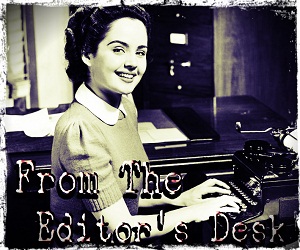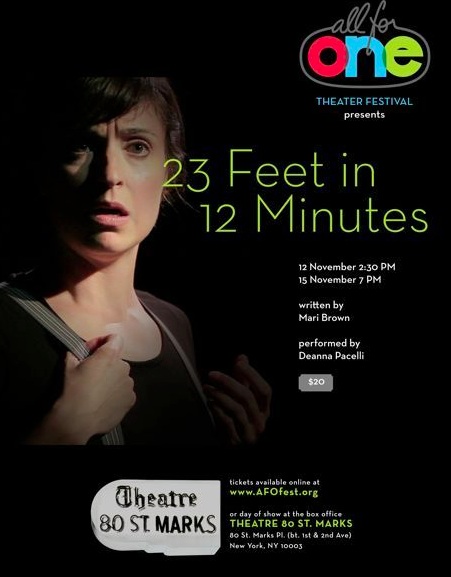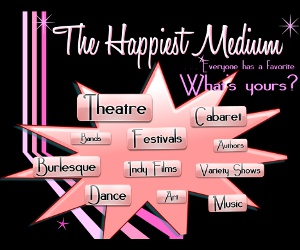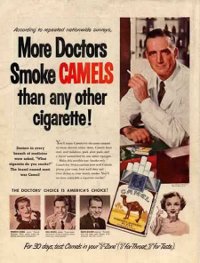15 months ago I had the opportunity to review 23 Feet In 12 Minutes as it premiered in the 2010 NYC Fringe Festival. Since then this show has made it to New Orleans and back with some wonderful work-shopping in the Cape Cod Theatre Project along the way. It came back to New York as part of the All For One Festival and I was lucky enough to see the newly evolved work. While the show only had a 2 day run I thought I’d do an in-depth exploration of the piece highlighting the evolution from the version I saw 15 months ago. I hope 23 Feet In 12 Minutes will continue to be performed and developed in the future, and continue to have a wider and wider audience, because while it gives gripping stories of many of the tragic human consequences that happened following the touchdown of Hurricane Katrina, it also shows us the best of humanity.
Written by Mari Brown, performed by Deanna Pacelli, and directed by Pamela Berlin and David Travis this new revision moves from the free-flowing stream of conciousness writing and performing in the premiere version, to a well thought out piece where every action (or inaction) seems carefully weighted and balanced to tell a story with a beginning, a middle, and a NOW. At the end I think anyone who sees this will want to do whatever they can to help prevent disasters – wherever they happen in the world – from getting this out of control again by emulating the people they’ve seen represented in this show. Last time I wrote a review, I compared everyone to heroes. This time I think it is more apt to compare them to saints both because the Saints are the New Orleans team, but also because I hope that these stories can help others learn to live by the examples given by Saints in the spiritual sense. The fact that all of these characters in 23 Feet In 12 Minutes came from interviews of real people makes it even more inspiring — and akin to the history of what elevates a person to sainthood.
In this new version, there is more of a sense of time passed than of time flowing. It’s less frantic and more reflective. We see a group of people who have been through a lot and had different ways of reacting in the end, all of them good, all of them bettering the world in small or larger ways, all seeing the world in a way that was transformed by the experience.
There seems to be more power done with less story, less scenes, giving the audience time to think and digest. These silent omissions amplify the piece by giving us more time to think about what the story means similarly to the way the characters in this play had time to think since Hurricane Katrina. An example of this is Robert, who lost 2 people in his family the night of the storm- his granddaughter and his mother. The story is made some how stronger by the fact that this little girl is never mentioned after she is swept away; as if there is nothing more that could be said which could accurately sum up his grief. Additionally, the urgency for the family to stay together and keep going is powerful enough to distract Robert, giving him no time to decompress and deal with the loss of his loved ones. We just have just his own wonder at having arrived at his point in the future when he says in his last line:
If you had told me six years ago, when 85 % of the city was underwater that the Saints were going to win the Superbowl? I woulda said ‘you crazy’. But God is Good.
The recent Hurricane Irene is significant in the telling of this story in part because of its lack of significance. Even though New York City has been hit by a number of hurricanes it has generally been very well prepared for themost contingencies with strong evacuation plans in place. Looking at the history of hurricane damage in New Orleans, it seems it was truly a perfect storm due to the ill preparedness.
The character of Francisco seems like a perpetual tourist of sorts, so intoxicated is he by the beauty of New Orleans. He’s never gone beyond the first dream of wanting to make it big taking pictures of the Big Easy. This dream keeps him moving through all the odd jobs that he had to take to survive over the next 10 years. He is so marginalized he can’t even afford to evacuate on the $21 he has left in this world. So when the storm hits he interacts with some homeless people and is guided through the least quick way to get out of New Orleans. Eventually he ends up as a refugee in San Antonio Texas and has lived there ever since. Hearing how he kept a cool head throughout, and was ready to lay down his dream after surviving the nightmare is symbolic of many marginal people who either were native to New Orleans or who were attracted to its magic.
One poignant scene is when Francisco is in the airport, five days after Katrina struck. He waits 3o hours to be evacuated with thousands of other people. Everyone filthy and exhausted by the horror of it all or running around like crazy in the ensuing anarchy. He finds a guitar and takes it over to where a group of children are and plays “Happy Birthday” because it is the only song he knows. The children laugh at the silliness of singing “Happy Birthday” again and again and it was the first time he laughed in a week. Once they begin to board, everyone must go through security. Seeing infants in dirty diapers being scanned by security greatly frustrates Francisco. He says in his closing statement:
New Orleans is BROKE. That’s what new Orleans is. She is like a little old lady in a cheap fancy church hat who was walking down the street a little bit drunk who was carrying all her cash in her little white purse and she got attacked. She got beat up. They took all her money. And now she has been begging in the street for six YEARS so she’s all dirty and smelly and people think she’s just totally BROKE. And the irony is the only people who actually help are ALSO BROKE.
We can contrast Francisco with Max, our Saint of Charity, who came to New Orleans as just a tourist for his brother’s bachelor party. The free living of New Orleans made him uncomfortable because of his devotion to being a strong Christian. When they hear that the storm is coming they are evacuated in the first wave since they were affluent tourists with means to pay for alternate ways out. As the disaster begins to unfold, a light dawns on Max that he should get back into the disaster. What could he do to help? WWJD? He stretches the truth and claims to work in Sanitation (he was in charge of trash at church). He follows a somewhat crazed preacher, doing all matter of first aid to save those that are injured working as hard as he could to help as many people as he could.
I was scared. The enormity of the situation was overwhelming. But if you bring a prayer to God, you’ve got to be strong enough to leave it there. You can’t keep running back to check on it, and ask God why he hasn’t done it yet. You give him your burden and then you wait for his miracle to work. That’s faith.
We see Louise, a doctor, who at the age of seven was on a ship in World War II which carried Italian soldiers whose wound were being kept open with plaster of Paris. In her we see a Saint of Vigilance. Screams of agony made her very pragmatic, which she uses as her chief virtue in this story. Whether working in a trauma ward for two days straight or arming the nurses to protect the children’s ward from looters, she is a tough character in this play.
New Orleans is my drug. And like a junkie I will do anything to protect my stash.
Joseph and his wife made it through the initial storm surge by using a crow bar to hack a hole in their roof so they could be high up during the storm. They are Our Saints of Collectedness (knowing when to rest). For the first days they walked with an overburdened garbage can on wheels. They had to set it aside but were welcomed by a friendly stranger who they stayed with for the remaining days until they were evacuated to the Super Dome. The conditions there were hellish – old people dying, rapes, lack of sanitation and sometimes children who had lost a parent. A moment that Joseph sees as the defining moment of this time was after he put one of those lost babies onto an opened cardboard box to keep it safe. He and others surrounded the baby, added other babies, forming a ring of calm that spread out in waves throughout the whole place. He says at the end:
And that’s what you should do if you’re in this situation. Put a cardboard box on the ground. You start the calm. It’ll grow.
There is also Katie: an expert in mobilizing foreign aid, who want to go to New Orleans but is not allowed to go. She mobilizes aid which she is really good at, but is slowed down by all the layers of authorities. She is our saint of the New Connections in a world too filled with the old and the stagnant ways of thinking.
I have ambulances from Tennessee, I have state troopers from Virginia, I have 15,000 MREs sitting in trucks outside a warehouse in Pennsylvania wating for a a fucking address from you people, I have France and Germany and SENEGAL calling me asking what they can do! BYPASS the fucking chain of command!
This emphasizes why much of the horror and deaths and damages could have been avoided by more efficient planning or by having more determined leadership.
Finally there is a singer, Delilah, who is the type of person you always expect to find in New Orleans, our Saint of Hope. Friendly, full of humor and ready to take on anything. After she realizes no one is coming to help after 4 days waiting on their roof, and just seeing the helicopters fly by over head in reconnaissance missions, the band of people she was with decided to hotwire a bus and try to make it out. Eventually they come to an area where there were hundred of reporters who don’t help her any at all, and clearly are there just to cash in on the misery of others. This infuriates her. A reporter who was drinking a bottle of water pointed refuses to share with the dehydrated people who haven’t had water in days. “This is for me and my crew… I’m not giving you anything“. To this Delilah responded:
And you know, I had been really upbeat and trying to keep everybody happy, trying to make the kids laugh and trying to cook and feed people and do everything I could to stay positive, but when she said that to me, I lost it. I COMPLETELY WENT MAD.
At this point a police officer, who was seeing the whole situation encourages her to go, because it is better to help save some of the people instead of being mad at others for inaction. She just keeps driving, past one barricade after another and sees other buses being guarded by national guardsman. She drives and drives until almost out of gas and then finds a town, and another helpful police officer (showing again an ideal that people in authority should aim to live up to). Finally she makes it to a place where she knows she’ll be able to start over.
The collaboration between Mari Brown’s writing, Deanna Pacelli expert portrayal of these characters, the new material added since work-shopping the piece, and the directors Pamela Berlin and David Travis have come together to create a strong piece of theatre — one that should continue to grow and evolve. I could see 23 Feet in 12 Minutes being studied in ethics courses or being used to inspire those who feel like they are hopeless. I wish the team putting this together all the best of luck and hope I can one day come up with a contribution to society just as good as 23 Feet in 12 Minutes. Many thanks.
~~~
23 Feet in 12 Minutes ran as part of the All For One Festival at Theatre 80 St. Marks.
23 Feet In 12 Minutes from Mari Brown on Vimeo.
Short









{ 1 comment… read it below or add one }
Thank you so much for this lovely distillation of the piece. We are very flattered that you think it has grown so much. We are grateful for your support of our work! Best, Mari